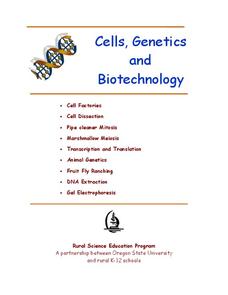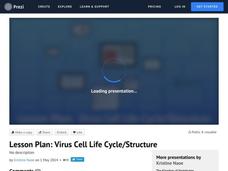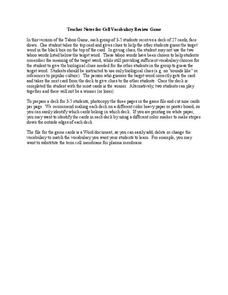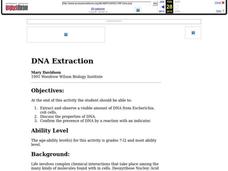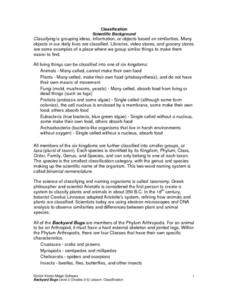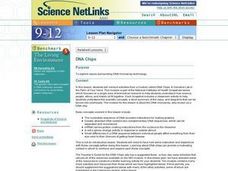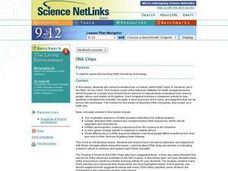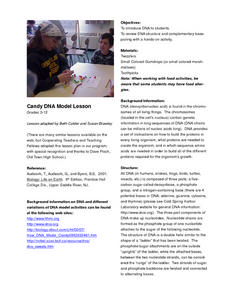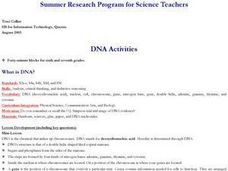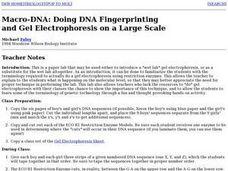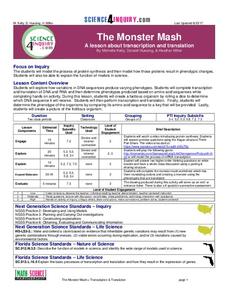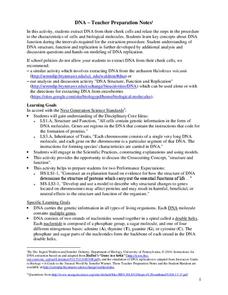Rural Science Education Program
Cells, Genetics, and Biotechnology
For scholars tired of reading the textbook, this unit includes nine hands-on lessons. Through group work, lab activities, experiments, and even one inquiry-based lesson, scholars apply knowledge about cells, genetics, and...
Howard Hughes Medical Institute
Ebola: Disease Detectives
How did the Ebola virus first infect humans? Young virologists examine genetic sequences from the 2014 Sierra Leone outbreak to find similarities during a riveting activity. Following similar methods used by MIT and Harvard, partners...
Curated OER
Macro-DNA: Doing DNA Fingerprinting
Students explore gel electrophoresis using paper models. They model DNA sequences and shade the boxes on their Gel Electrophoresis Sheet which represent the individual fragments.
ConnectED
Crime Scene Investigation
How exactly does a crime scene investigation work? The resource, a unit on criminology, covers everything from the deductive reasoning skills needed for detectives to DNA fingerprinting, all the way to how to gather evidence and bring...
Macmillan Education
A Wrinkle in Time Discussion and Activity Guide
As you work through Madeleine L'Engle's A Wrinkle in Time, try out some or all of the 20 questions and activities included here. Useful for discussion questions, group assignments, or individual projects, this resource covers plot as...
Prezi
Virus Cell Life Cycle/Structure
Viruses were nano before it was cool to be nano. The presentation covers the structure of a virus cell and the life cycle of a virus. It also includes two videos illustrating the virus cell in greater detail.
Center for Technology in Teaching and Learning
CSI: The Experience - Family Forensics
Forensic scientists depend on their observation skills to analyze evidence down to the molecular level. Middle and high schoolers practice making observations and predictions with a series of crime scene activities, which includes a...
Howard Hughes Medical Institute
Understanding Variation
Does where we live influence how our bodies express genetic traits? Explore variation in human skin color with an activity that incorporate video and hands-on learning. Individuals model the relationship between phenotypes and genotypes,...
Agriculture in the Classroom
"Steer" Toward STEM: Careers in Animal Agriculture
Think like an engineer and an agricultural scientist over the course of 12 lessons in a STEM based unit. Young scientists take on the roles of animal physiologists, animal geneticists, agricultural engineers, animal nutritionists,...
Serendip
Cell Vocabulary Review Game
Can science scholars describe a nucleus without mentioning DNA, or a chloroplast without mentioning the color green? Test their organelle understanding through an exciting card game. Groups take turns guessing the correct organelle or...
Curated OER
Teacher Preparation Notes on Genetics
Students explore genetics through various hands-on activities. In this biology instructional activity, students predict the probability of offspring genotypes and phenotypes using the Punnett Square. They explain the causes of genetic...
Serendip
From Gene to Protein via Transcription and Translation
DNA carries the codes for creating just the right protein. A well-designed lesson leads pupils through the process from start to finish and everywhere in between. Guiding questions with supporting video help scholars understand the...
Personal Genetics Education Project
How Does Ancestry Testing Work? Exploring Admixture Testing
Find out the science behind ancestry testing! Investigators watch a video exploring how ancestry works before participating in a hands-on group activity. Scholars role play scientists while learning about testing protocols and test...
Curated OER
DNA Extraction
Students are able to extract and observe a visible amount of DNA from Escherichia coli cells. They discuss the properties of DNA. Students confirm the presence of DNA by a reaction with an indicator.
Curated OER
Backyard Bugs
Explore the concept of scientific classification and the similarities and differences between plant and animal species. Your class will participate in hands-on activities by investigating dichotomous keys and classifying their shoes. To...
Curated OER
Strawberry Smoothies
Biologists extract the DNA from a strawberry. After completing the procedure, learners write answers to a few questions on the lab sheet provided. This is ideal lab practice during a DNA unit in your general biology course.
Curated OER
Chromosomes, DNA, and Genes-Roadmap To Understanding The Foundation Of Genetics
Students investigate DNA by doing a hands on activity. In this activity lesson students participate in a lab that allows to explore DNA and chromosomes.
Curated OER
DNA Chips
Students explore issues surrounding DNA microarray technology. They focus on a single area of biomedical research to help them explain how science, people, ethics, and history all fit together. They analyze gene-expression data.
Curated OER
DNA Chips
Students discover what they need to know about DNA chips. They extend this knowledge to analyze gene expression data to diagnose two kinds of leukemia.
Curated OER
Candy DNA Model Lesson
Young scholars explore DNA structure using materials such as Twizzlers, small colored gumdrops and/or toothpicks.
Curated OER
DNA Activities
Students work together to identify the structure of DNA. They practice using new vocabulary as well. They create a 3-D model of DNA to complete the instructional activity.
Curated OER
Macro-DNA: Doing DNA Fingerprinting and Gel Electrophoresis
Students create numbered DNA sequences by taping together the order of the sequence. They count the number of bases in their RFLP's and shade the boxes on their Gel Electrophoresis sheets that represent individual fragments. They...
Science 4 Inquiry
The Monster Mash
Young scientists create monsters by applying their knowledge of transcription and translation. They randomly find the DNA, assign it a codon, and build monsters piece by piece.
Curated OER
Extracting DNA from Your Cells - Teacher Preparation Notes
Students extract their own DNA from cheek cells. In this biology instructional activity, students explain the replication process. They identify the structure and composition of DNA.


